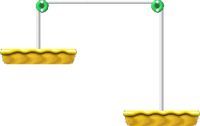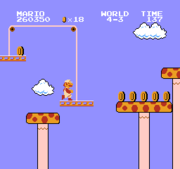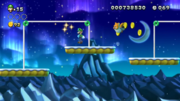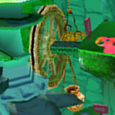Scale Lift
It has been requested that this article be rewritten and expanded to include more information. Reason: include info on Donkey Kong Country Returns / Donkey Kong Country Returns 3D (specifically Weighty Way)
- This article is about the scale-like platforms. For lifts in general, see Lift.
| Scale Lift | |||
|---|---|---|---|
 Model from New Super Mario Bros. Wii | |||
| First appearance | Super Mario Bros. (1985) | ||
| Latest appearance | Game & Watch: Super Mario Bros. (2020) | ||
| Effect | Standing on one platform causes it to lower and the other to rise | ||
| Variant of | Lift | ||
| |||
Scale Lifts, also called Balance Lifts,[1] Balance Beams,[2] and Scale Platforms,[3] are platforms present in the Super Mario series. When a player lands on one platform, the parallel one rises. If the player lingers too long on one platform, the scale breaks apart.
History[edit]
Super Mario series[edit]
Super Mario Bros. / Super Mario Bros.: The Lost Levels[edit]

Balance Lifts make their first appearance in Super Mario Bros., where they are the main gimmick of World 3-3, World 4-3 and World 6-3. The player is given 1,000 points if they break the lifts. They return in Super Mario Bros.: The Lost Levels, where they are more prevalent, being found in eight of the thirteen worlds. This time, they are made of mushrooms instead of metal. However, in the Super Mario All-Stars remake, both games feature them in their metallic form.
Super Mario Sunshine[edit]
Scale Lifts (localized as scales[4]) are built into the cliffside of Noki Bay. In this game, a scale is a pulley system with a platform attached to it. Filling the attached jug with water causes the platform to rise. The jug is cracked and slowly leaks water, causing the platform to lower.
Super Mario Advance 4: Super Mario Bros. 3[edit]
Super Mario Bros.-styled Balance Lifts appear in Super Mario Advance 4: Super Mario Bros. 3, in the World-e level Caped Escape.
New Super Mario Bros.[edit]
Balance Lifts reappear in New Super Mario Bros. in World 1-5 and World 3-2. They behave the same way as the Lifts do in Super Mario Bros.
New Super Mario Bros. Wii[edit]
Balance Lifts reappear in New Super Mario Bros. Wii, where they are the main gimmick of World 6-4. Unlike the lifts in Super Mario Bros., enemies and other items affect the scales with the player.
New Super Mario Bros. 2[edit]
Balance Lifts reappear in New Super Mario Bros. 2, in World 4-4 and World ![]() Star-5. Unlike the lifts in New Super Mario Bros. Wii, these lifts reappear after breaking.
Star-5. Unlike the lifts in New Super Mario Bros. Wii, these lifts reappear after breaking.
New Super Mario Bros. U / New Super Luigi U / New Super Mario Bros. U Deluxe[edit]
Scale Lifts appear in New Super Mario Bros. U, New Super Luigi U, and their remake. They are common objects in Above the Cheep Cheep Seas and Scaling the Mountainside in the former, and also appear in Weighty Waddlewings in the latter. They work as they did in New Super Mario Bros. 2.
Mario vs. Donkey Kong 2: March of the Minis[edit]
Scale Lifts appear in Mario vs. Donkey Kong 2: March of the Minis, where they are known as Balance Beams. They only appear in Room 6-4 and Room 6-7 of Toadstool Castle. If a Mini Mario steps onto one of the Balance Beam's platforms, it lowers while the other platform rises. Two Mini Marios can remain on a platform at once. If both platforms have the same number of Mini Marios on them, they both move to a middle height. A Mini Mario remains on a Balance Beam's platform until it is swiped with the stylus to change its direction. Unlike their appearances in other games, Balance Beams do not break. Balance Beams cannot be used in the Construction Zone, as they do not appear in the Toadstool Castle construction kit.
Super Smash Bros. series[edit]
Scale Lifts also appear as stage elements in the Super Smash Bros. series; they react to fighters' weights and drop or rise at appropriate speeds. They also reappear after breaking. One appears in the Mushroom Kingdom stage of Super Smash Bros. and another appears in the Mushroom Kingdom stage of Super Smash Bros. Melee. Another appears in Super Smash Bros. for Nintendo 3DS, as part of the Golden Plains stage, though it is only available if the stage has scrolled to the right side. Scale Lifts reappear in Super Smash Bros. Ultimate in Golden Plains and the original Mushroom Kingdom stage, where they act the same as they did in previous games.
Gallery[edit]
Names in other languages[edit]
| Language | Name | Meaning | Notes |
|---|---|---|---|
| Japanese | てんびんリフト[5] Tenbin Rifuto |
Scale Lift | |
| 水掛瓶リフト[6] Mizukake Bin Rifuto |
Water Jug Lift | variant from Super Mario Sunshine | |
| Chinese | 天秤[?] Tiānchèng |
Scales | |
| French | Balancier[7] | Pendulum | |
| Italian | Saliscendi[8][9] | Lift | New Super Mario Bros. U (in-game), Super Smash Bros. Ultimate |
| Piattaforma a bilancia[10] | Scale Lift | Super Mario Bros. Encyclopedia (Super Mario Bros. section) | |
| Piattaforma bilancia[11] | Super Mario Bros. Encyclopedia (Super Mario Bros. The Lost Levels, New Super Mario Bros., New Super Mario Bros. Wii, New Super Mario Bros. 2 sections) | ||
| Ascensore bilancia[12] | Super Mario Bros. Encyclopedia (New Super Mario Bros. U section) | ||
| Korean | 저울리프트[?] Jeoul Ripeuteu |
Balance Lift | |
| Portuguese | Ascensor em Escada[13] | Stair Lift | |
| Russian | Лифт-качели[?] Lift-kacheli |
Swing/seesaw lift |
References[edit]
- ^ Tochikubo, Hiroo (1987). How to win at Super Mario Bros.. Tokuma Shoten. ISBN 4-19-720003-XC. Page 47.
- ^ Mario vs. Donkey Kong 2: March of the Minis help (no. 21)
- ^ Stratton, Steve (November 18, 2012). New Super Mario Bros. U PRIMA Official Game Guide. Prima Games (American English). ISBN 978-0-307-89690-2. Page 107.
- ^ Averill, Alan, and Jennifer Villarreal (2002). Super Mario Sunshine Player's Guide. Redmond: Nintendo of America (American English). ISBN 1-930206-23-2. Page 87.
- ^ Sakai, Kazuya (Ambit), kikai, Akinori Sao, Junko Fukuda, Kunio Takayama, and Ko Nakahara (Shogakukan), editors (2015). 『スーパーマリオブラザーズ百科: 任天堂公式ガイドブック』. Tokyo: Shogakukan (Japanese). ISBN 978-4-09-106569-8. Page 21, 29, 119, 150, 200, 216.
- ^ ---- (2015). "Super Mario Sunshine" in 『スーパーマリオブラザーズ百科: 任天堂公式ガイドブック』. Tokyo: Shogakukan (Japanese). Page 105.
- ^ Chaîne New Super Mario Bros. U. New Super Mario Bros. U - Mont Sorbet-4 - Troisième pièce étoile (Wii U) video description. YouTube. Retrieved September 8, 2024.
- ^ New Super Mario Bros. U, Saliscendi e cannoni.
- ^ Super Smash Bros. Ultimate tips, Golden Plains section: "Saliscendi"
- ^ November 15, 2018. Super Mario Bros. Enciclopedia. Magazzini Salani (Italian). ISBN 889367436X. Page 21.
- ^ November 15, 2018. Super Mario Bros. Enciclopedia. Magazzini Salani (Italian). ISBN 889367436X. Page 29, 119, 151, 200.
- ^ November 15, 2018. Super Mario Bros. Enciclopedia. Magazzini Salani (Italian). ISBN 889367436X. Page 216.
- ^ Canal New Super Mario Bros. U. New Super Mario Bros. U - Planalto Sorvete-4 - Terceira Moeda-Estrela (Wii U). YouTube. Retrieved September 8, 2024.
- Lifts
- Mario vs. Donkey Kong 2: March of the Minis
- New Super Luigi U objects
- New Super Mario Bros. objects
- New Super Mario Bros. 2 objects
- New Super Mario Bros. U objects
- New Super Mario Bros. Wii objects
- Super Mario Bros. objects
- Super Mario Bros.: The Lost Levels objects
- Super Mario Sunshine objects
- Super Smash Bros. for Nintendo 3DS / Wii U
- Super Smash Bros. Melee


